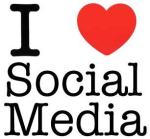The Good, The Bad and The Cautious by Mervyn

Conference season is in full swing. In recent weeks I’ve attended four recruitment and HR conferences at which – surprise surprise – one of the burning topics was yet again social media.
Clearly it’s a subject that won’t go away – nor should it – but I can certainly detect a shift in attitudes with companies showing a distinct interest, even keenness, to embrace the opportunities.
Most heart-warmingly it was at Recruitment International’s seminar for SME recruitment agencies that I noticed a big shift. I delivered the session ‘The Key to Social Media’ which I started with the question ‘how many companies here have a twitter account?’ to find that over half did! Not only that, but they wanted to learn how to use them properly and get more from them!
I won’t repeat my session here. Suffice to say that leading them through the industry’s communication journey of phone and rolodex, to fax, then computer, e-mail, mobile and now social media highlighted that it’s an evolution not a revolution and companies will adapt much as they have done previously.
This approach helps to focus on the conversation not the medium. On participation, openness, conversation, community and the benefits of connectedness… and the rules of engagement as opposed to the fear of the unknown.
After all, with our previously preferred communication tools now seen as the biggest distractions in the workplace, and new trainees much more adept at communicating through social channels and messaging as opposed to the traditional land-line phone, this is a shift we may all have to accommodate sooner rather than later.
However it’s not all optimism and a sense of adventure at a conference now…there’s the ubiquitous presentation from a law firm to sit through. And don’t they see things differently!
We hear of benefits and opportunities from companies, then of problems and risks from the lawyers.
First we listen to positive outcomes from setting out guidelines and letting employees get involved, then we get told to have policies and limit, even outlaw, usage.
I have sat through examples from companies as diverse as Boots, ITV, Unilever and Ivensys of how social media has delivered positive recruitment outcomes – and then watched the lawyers talk about their 2 cases. They only seem to have 2 – Hays (now 3 years old) and Flexman (still ongoing, and facts as yet unclear).
Did lawyers ever give presentations about the dangers to business of the phone? Fax machine? Using mobiles?
And lawyers also always now seem to quote Neil Morrison! Since having some of his quotes published in HR magazines he seems to have become the lawyers’ poster boy for a trusting, laissez faire approach to tweeting in the work place. And they don’t agree with him! Presentations usually feature his quote “I don’t think you should have a social media policy – what you are saying is ‘we don’t trust you’” followed by reasons why you should have a policy!
A lot of this smacks of old business protectionism to me. I’ve sat through many scaremongering sections about keeping clients and contacts, the old ‘restraint of trade’ clause being replaced by the new ‘we own your LinkedIn contacts’ one.
But business is changing. Clients are savvier. If you’re an agency recruiter and your client contacts come from a PSL, or contractual arrangement, then they will clearly remain where they are – the firm has the contract. Where there is no such arrangement though, the firm can’t guarantee they will keep the business. They can try and stop you speaking to contacts but can’t guarantee that, if successful, those contacts will continue to give them business.
It may be that business finds its own way of embracing social in this area. Last year IBM hosted a Social Jam – a 72 hour online conversation, drawing on 2700 participants from around the world, exploring key issues around a social business strategy. I will blog more about this in a future post, but there’s one very relevant finding that I’d like to share:
“HR needs to embrace the fact that employees have their own personal brands that exist both inside and outside the business and that it does not own these brands but merely “rents” them while employees are at work. Personal brands need to be measured and rewarded based on how they help your company throughout the social network. As employees transition and become alumni of an organization, it becomes even more important that HR maintains relationships with its alumni network. Social tools can help provide a strong, dynamic way to keep the alumni network active and useful, enabling the organization to keep an invaluable source of knowledge, mentoring and connections.
In order to take full advantage of the capabilities, HR must work with leadership to expand and instill the use of social technologies in practical and significant ways—a fundamental cultural change. Information can get lost and conversations can taper off when email is the primary form of communication. “I think leaders have a responsibility, where it makes sense, to move people out of email,” a participant wrote. “I heard someone once say that ‘email is where information goes to die,’ implying that we lose something by forcing knowledge into that channel.”
Not sure how the lawyers will take to that one!
Let me know what you think…

No comments:
Post a Comment